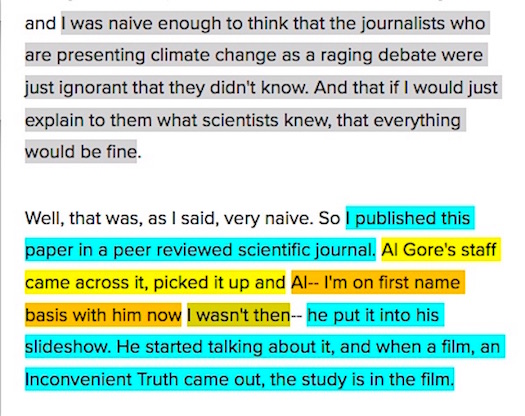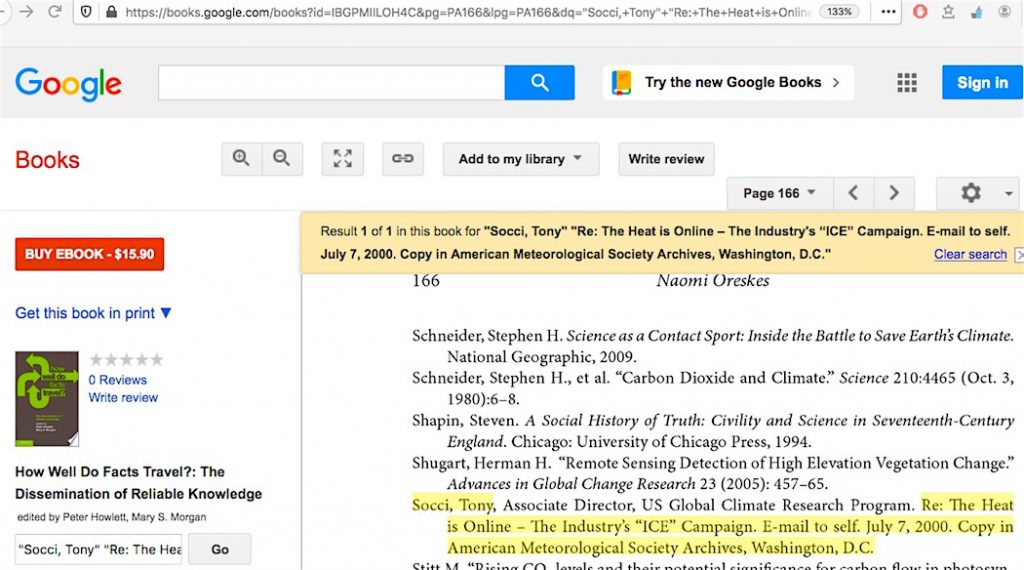
Regarding Naomi Oreskes’ “Merchants of Doubt” co-author also being on a similar first-name, or any-name basis with Gore ….. not so much, it seems.
I pointed to Oreskes’ little name-drop in only fleeting fashion in my June 17, 2020 blog post. Time now to explore it further as yet another example of a widespread problem with the entire ‘crooked skeptic climate scientists’ accusation: pull on even the smallest of loose threads in that accusation, and the fabric of the overall accusation starts to unravel in multiple directions instead of cinch together more tightly.
Just askin’ — why is she on a first-name basis with Al Gore?
In all my efforts to sift through Oreskes’ explanations of why she’s involved in the global warming issue in any capacity, her March 2020 podcast interview is the only one I’ve found so far that mentions anything about how her December 2004 Science magazine paper (which supposedly proved there was a 100% science-based consensus about the certainty of global warming being primarily driven by human activity) got included in Al Gore’s “An Inconvenient Truth” movie. But as she implies in her podcast remark, that inclusion back around 2006 didn’t earn her the privilege she has right now.
What did?
Keep in mind that Gore’s 2006 movie is a case study example of how the whole issue boils down to the three talking points of “settled science” / “industry-corrupted skeptic climate scientists” / “we all may ignore those skeptics because of points 1 & 2. The first hour and twelve minutes was about the settled science, then Gore prominently showed Oreskes’ 928-to-0 consensus notion in a can’t-miss manner, after which he segued just seconds later into spelling out the worthless ‘leaked memo’ phrase “reposition global warming as theory rather than fact” while comparing it in equally can’t-miss fashion to a leaked memo from the tobacco industry. On screen, but barely seen, Orestes’s science paper is only credited as the partly visible words “Science, Dece .. Vol. 306, Issue..” Gore’s movie companion book credits Ross Gelbspan in a big – and hugely incorrect – way for the “reposition global warming” phrase. Is Gelbspan on a bigger first-name basis for that?
Oreskes didn’t bring up the “reposition global warming” memo set in any prominent way after 2004 until she featured it in her oft-cited 2008 PowerPoint presentation (full presentation online here), where she falsely attributed it to the Western Fuels Association (WFA) “Information Council for the Environment” (ICE) public relations pilot project campaign. Her most famous publication, the May 25, 2010-published “Merchants of Doubt” book she co-authored with Erik Conway, never even mentions the ICE campaign, its Index has a “Western Aerosol Information Bureau” reference but lists no “Western Fuels Association,” and the one place where WFA actually is mentioned, it’s in association to skeptic climate scientists Dr Patrick Michaels and Dr S Fred Singer.
Why didn’t Oreskes use the “reposition global warming” memo set in “Merchants of Doubt”? Did the book publisher reject it?
She was perhaps perturbed enough about this – whatever the reason for the exclusion was – that she specifically brought it up in an Australian television appearance a month before “Merchants of Doubt” was published, with a particular cryptic reference to the, well …non-WFA strategy goal:
The number one point of this strategy was to reposition global warming as theory, not fact. That is to say, it’s just a theory, it’s just an idea, we don’t really know for sure if it’s true.
So step one was to cast doubt on the fact of global warming, and then step two actually was construct it as a bad fact…
“Bad fact”?? What a weird way of putting it. But when examiners look deeper into this, the question arises on whether she was alluding to the entire book chapter that she was contributing at that time to the soon-to-be-published anthology book titled “How Well do Facts Travel?” in which her contributed chapter about the WFA and the “reposition global warming” memo set was titled “My facts are better than your facts.”
The question about her wording there just one small loose thread in that situation. There’s far more when you pull on that one. Not only did she mention (falsely) in her ‘Better Facts’ chapter that the “reposition global warming” memo set was attributed to the WFA, she said the set and other WFA documents were available in the archives of the American Meteorological Society (AMS) (they were never there) and further that a man named Anthony Socci had alerted her to that WFA documents collection.
Socci, a 1990s-era Senate staffer who had prominent association with Al Gore. Why would Socci know of this WFA document collection at AMS, and if it really was only a personal copy set, did he himself get it directly from Al Gore? Beyond that, what possible reason would Socci have to alert Oreskes to this ‘nonexistent’ / ‘personal document file’ at AMS, and when did he do this? Oreskes’ Bibliography line for “Socci 2000” (referring to those WFA newspaper ads) doesn’t answer anything, it only opens up more questions about why there is a reference to Ross Gelbspan’s “The Coal Industry’s “ICE” Campaign,” and what the significance of Socci’s “E-mail to self” bit is.

Why would anybody email a note to themselves about Ross Gelbspan’s false diatribe about the Western Fuels Association?
I am unable to interview and – far more importantly – properly record responses from people ranging from Gelbspan to Oreskes, Socci and Al Gore. Professional article writer / researcher Ron Arnold, using tips I supplied, directly interviewed more participants of that ICE campaign than I had access to for his examination of this ‘Naomi Oreskes / Anthony Socci’ mess. Additional professional investigators like Ron Arnold are desperately needed in order to get all the way to the bottom of this. Since Oreskes’ ‘Better Facts’ chapter is cited in global warming lawsuits such as Delaware v BP, et al. as evidence just one page away from those ICE newspaper ads that she connected to Socci, the teams at the law firms defending energy companies might also want to pull as hard as they can on these loose threads.
The questions about Socci / Oreskes / Gore don’t end there.
It could be arguably said that Oreskes put her credibility on the line by describing what is tantamount to a 100% consensus of science papers favoring the notion of man-caused global warming. The late Dr S Fred Singer had a viewpoint that decidedly undercut that notion on no uncertain terms in a language the general public could easily understand. He stated that before Oreskes consensus paper came out, and again later in a 2000 PBS Nova / Frontline program, while also being essentially ridiculed for it at another news outlet, and also at a particular website in …. guess what utterly predictable way?
Naomi Oreskes probably didn’t like Dr Singer very much if he could derail all that she said about consensus opinion validating science conclusions. Is she on a first-name basis with Al Gore because of their shared fear of Dr Singer?
After all, Dr Singer described in quite some detail how Al Gore, apparently with assistance from Justin Lancaster (that Justin “contradicts Gelbspan” Lancaster) and Anthony Socci, tried to intimidate him into silence over the news of Gore’s influential college science professor recanting his viewpoints on man-caused global warming. That effort ultimately fell apart not long after another of Gore’s very prominent efforts to suppress Dr Singer backfired in an acutely embarrassing way.
There doesn’t seem to be any graceful exit for Oreskes out of her appearance of having a rough time keeping her personal narratives straight. If Al Gore is put under oath in one of the current 20+ global warming lawsuits, will he be able to offer a straightforward explanation of why she claims to be on a first-name basis with him, or will that narrative crumble apart, too?
Just askin’.
Naomi “loose threads” Oreskes — just sayin’. Imagine if someone with far more influence and prominence than me starts pulling on all those threads and unravels who’s apparently behind the nearly 30 year smear of skeptic climate scientists.
